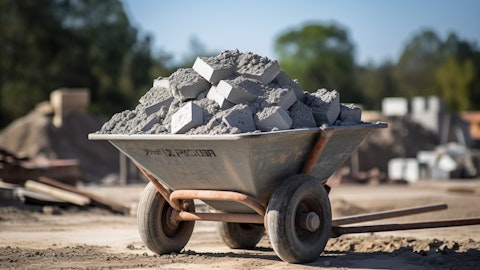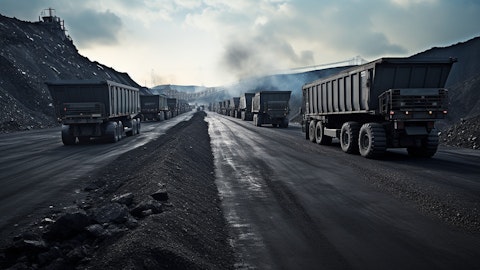Astec Industries, Inc. (NASDAQ:ASTE) Q1 2025 Earnings Call Transcript April 29, 2025
Astec Industries, Inc. beats earnings expectations. Reported EPS is $0.88, expectations were $0.46.
Operator: Hello and welcome to the Astec Industries First Quarter 2025 Earnings Call. As a reminder, this conference call is being recorded. It is my pleasure to introduce your host, Steve Anderson, Senior Vice President of Administration and Investor Relations.
Steve Anderson: Thank you. Good morning, everyone. Joining me on today’s call are Jaco van der Merwe, our Chief Executive Officer; and Brian Harris, our Chief Financial Officer. In just a moment, I’ll turn the call over to Jaco to provide his comments and then Brian will summarize our financial results. For your convenience, a copy of our press release and presentation are posted on our website under the Investor Relations tab at www.astecindustries.com. Turning to Slide 2, I’ll remind you that our discussion this morning may contain forward-looking statements that relate to the future performance of the company and these statements are intended to qualify for the Safe Harbor liability established by the Private Securities Litigation Reform Act.
Such statements are not guarantees of future performance and are subject to certain risks, uncertainties and assumptions. Factors that could influence our results are highlighted in today’s financial news release and others are contained in our filings with the U.S. Securities and Exchange Commission. As usual, we ask that you familiarize yourself with those factors. In an effort to provide investors with additional information regarding the company’s results, the company refers to various U.S. GAAP and non-GAAP financial measures, which management believes provides useful information to investors. These non-GAAP measures have no standardized meaning prescribed by U.S. GAAP and are therefore unlikely to be comparable to the calculation of similar measures for other companies.
Management does not intend these items to be considered in isolation or as a substitute for the related GAAP measures. A reconciliation of GAAP to non-GAAP results are included in our news release and the appendix of our slide presentation. And now turning to Slide 3, I’ll turn the call over to Jaco.
Jaco van der Merwe: Thank you, Steve. Good morning, everyone and thank you for joining us. Today is a very exciting day for the Astec family for two reasons. First, our team delivered exceptional results for Q1. And second, we are happy to announce we signed a definitive agreement to purchase TerraSource. TerraSource is a market-leading manufacturer of materials processing equipment and the related aftermarket parts, serving complementary crushing, screening and separation markets. We will talk more about TerraSource in a few minutes, but let me start on Slide 4 by telling you more about our first quarter results. I am pleased to report we experienced another strong quarter for net sales, adjusted EBITDA and adjusted earnings per share.
This is in line with our plans to deliver consistency, profitability and growth. Adjusted EBITDA of $35.2 million increased $16.3 million or 86.2% over the first quarter of 2024. Adjusted EBITDA margin of 10.7% increased 460 basis points and adjusted earnings per share was strong at $0.88. Although our backlog of $402.6 million moderated sequentially by 4.1%, we were encouraged by improved implied orders. In our Infrastructure Solutions segment, strong net sales for the quarter were primarily driven by capital equipment and healthy aftermarket part sales. We continue to see strong demand for asphalt and concrete plants, which was partially offset by softness in the demand for mobile paving and forestry units. Capital equipment sales in our Materials Solutions segment continued to be challenged by high interest rates and further dealer inventory destocking activity, while aftermarket part sales remained stable at healthy levels.
We were encouraged by the sequential double-digit improvement in our Materials Solutions backlog and implied orders, and we expect to see restocking activity resume in the second half of the year. Order intake momentum continued in April. Free cash flow of $16.6 million was 116% of net income and was generated due to increased profitability and continued focus on working capital management. For the full year 2025, we are maintaining our expectations for adjusted EBITDA in the range of $105 million to $125 million, excluding the impact of tariffs. On the topic of tariffs, we all know this is a very fluid situation. I will share more details on tariffs on Slide 7. On Slide 5, we provide a brief update of the state of our industry. As you know, America’s infrastructure is foundational to our national economy, global competitiveness and quality of life.
The 2025 report card for America’s infrastructure provided by the American Society of Civil Engineers highlights the need for continued infrastructure investment. Before recent legislation like the 2021 Infrastructure Investment and Jobs Act, many of our infrastructure networks have been neglected for decades. According to the report, Americas roads improved to a D+ rating in 2025 versus a rating of D in 2021. Although signs of progress have been made, the need for improvement to our roads is substantial. America’s more than 4.1 million miles of public roadways from a vital network, facilitating the movement of people and goods. Of that 4.1 million miles, 39% are in poor or mediocre condition. Bridges received a grade of C. Many bridges are approaching or having exceeded the 50-year life they were designed for.
Of the 623,000 bridges across the U.S., only 44% were deemed to be in a good condition. 49% in fair condition and 7% are in poor condition. Continued maintenance and upgrades are essential for these bridges to withstand the higher traffic volumes and vehicle weights they need to support. As you know, Astec is a niche industry player focused on the Rock to Road sector. We have strong brand recognition in the infrastructure sector, which is largely comprised of aggregates and road and bridge construction. Needed improvements to our infrastructure provide long-term stable demand for our equipment, aftermarket parts and digital solutions. Slide 6 show our booth at the 2025 World of Asphalt AGG1 show and conference held last month in St. Louis, Missouri.
Meeting with customers and interacting with our employees reminded me why I love working at Astec. We have great products, industry-changing technology and more importantly, the best team in the industry. As I walked the show and looked at other providers, I feel Astec is well positioned to win. We also invite you to mark your calendars for a 2026 CONEXPO trade show to be held in Las Vegas, Nevada on March 3 to 7, 2026. We are excited about the new products and technology we will display at this show. On Slide 7, we show proactive actions we are taking to mitigate the risk associated with the new tariff environment. Our OneAstec procurement team is requiring suppliers to provide support for any price increases, and we are actively negotiating all purchases.
We have initiated additional pricing actions, and we’ll continue to assess the situation to protect margins. We continue to practice dual sourcing and resourcing. We are managing supply chain alignment and will reshore to the United States when feasible. We are continually managing our manufacturing footprint. As you know, this is a dynamic situation that can change quickly, but the Astec team is diligently tracking the current and potential impact of the tariff environment. I’ll also mention this is a great time to be an American manufacturer. On Slide 8, we show our backlog information. Overall, our backlog declined slightly on a sequential basis but remained healthy supported by growth in employed orders. Current backlog levels in Infrastructure Solutions segment are a combination of strong invoicing for asphalt and concrete plants, delist ordering equipment closer to desired shipment dates, and internal operational excellence efforts to increase facility throughput.
That said we have experienced some softness in order for mobile paving products and the market for forestry products are currently slow. In our Materials Solutions segment, backlog grew $12.1 million or 10.6% due to increased order activity. As noted in prior quarters, we expect demand for Material Solutions products to pick up in the second half of the year. Our implied orders and book-to-bill trends are shown on Slide 9. We are pleased to report consolidated implied orders rose on a quarter-over-quarter and sequential basis. The Infrastructure Solutions segment continued to generate solid numbers. We were especially pleased with our Material Solutions segment, which posted an increase in implied orders for the second consecutive quarter and posted a book-to-bill ratio of 113% for Q1.
With that, I will now turn the call over to Brian to provide additional comments on our first quarter financial results.

Brian Harris: Thank you, Jaco and good morning. Our consolidated financial results are highlighted on Slide 11. The demand for Astec capital equipment and aftermarket parts continued as net sales grew 6.5% over the prior year first quarter and increased 2% and for the trailing 12 months ended March 31, 2025. We were pleased to generate an adjusted EBITDA of $35.2 million in the first quarter, which compares to $18.9 million in the first quarter of last year. Adjusted EBITDA margin reached 10.7%, a 460 basis points increase over the prior year. Adjusted EBITDA and adjusted EBITDA margins benefited from volume, pricing and mix as evidenced by a 320 basis point increase in gross margin. Adjusted selling, general and administrative expenses were relatively flat at approximately $63 million for the quarter, but improved by 130 basis points as a percentage of net sales.
Q1 adjusted earnings per share of $0.88 compared very favorably to $0.34 of earnings per share posted in Q1 2024. On a trailing 12-month basis, we increased net sales, adjusted EBITDA, adjusted EBITDA margin and adjusted earnings per share. This is in line with our commitment to provide consistency, profitability and growth and shows the actions we have taken are gaining traction. Moving on to the Infrastructure Solutions segment, shown on Slide 12, we generated higher net sales for the quarter due to strong domestic capital equipment performance. Aftermarket parts were slightly lower in the first quarter but remained at favorable levels. For the trailing 12 months, net sales in Infrastructure Solutions increased 10.7%. Segment operating adjusted EBITDA dollars and adjusted EBITDA margins were positively affected by volume, pricing and operational excellence initiatives and expense management.
Both posted solid increases on a quarter-over-quarter and trailing 12 months basis. The Material Solutions segment is shown on Slide 13. As previously noted, net sales for the quarter along with the trailing 12 months were negatively impacted by lower capital equipment sales resulting from the influence of high interest rates and dealer destocking. Aftermarket parts sales declined slightly but remained at healthy levels. Despite lower sales revenue, we have been able to control costs and achieve improved adjusted EBITDA margins. Moving on to the first quarter adjusted EBITDA bridge on Slide 14. We were pleased to report adjusted EBITDA of $35.2 million, an increase of $16.3 million over the first quarter of 2024. Favorable volume and pricing were the primary drivers.
Proactive OneAstec procurement efforts helped contain inflation, and manufacturing efficiencies also contributed. On Slide 15, we show adjusted EBITDA of $128.1 million on a trailing 12-month basis. This was an increase of $34.4 million or 36.7%, driven by increased volume, pricing, mix and expense management, partially offset by inflation and manufacturing inefficiencies and other period costs. On Slide 16, you can see we maintain a strong balance sheet with ample liquidity. We ended the quarter with cash and cash equivalents of $90.1 million, available credit of $148.8 million for a total available liquidity of $238.9 million. Our free cash flow in the quarter of $16.6 million was 116% of net income. These results were driven by profitable sales and sound working capital management.
I’ll now turn the call back to Jaco.
Jaco van der Merwe: Thank you, Brian. Turning to Slide 17. We are very pleased to announce we have entered into a definitive agreement to acquire TerraSource. This is our first step towards growth through a significant strategic acquisition. Moving to Slide 18. Let me share our strategic rationale for adding TerraSource to the Astec family of products. As you will see, TerraSource and Astec are a strong fit. TerraSource provides market-leading process equipment and aftermarket parts and services. They will strengthen our Material Solutions segment. Astec and TerraSource have complementary portfolios of products and technologies that will provide a meaningful synergy opportunity. Astec’s international footprint will be enhanced.
Our 2 companies are a strong cultural fit. On Slide 19, you can see TerraSource products and services align well with the Astec Rock to Road value chain. TerraSource has assembled sensory old brands that will flourish under our strategic ownership. This portfolio includes well-known and respected brands that include Gundlach Crushers, Peninsula Iron Works, Jeffrey Rader, Pennsylvania Crusher and Elgin. Their products and services are used in soft rock, rare earth and other minerals, dewatering and recycling applications used in diversified end markets. On Slide 20, we show information highlighting the size and scope of TerraSource. The company has over $150 million in annual revenue, approximately 400 employees and a diverse network of manufacturing, sales, service, engineering sites and channel partners.
TerraSource will be part of our Materials Solutions segment and will strengthen our business through scale and product portfolio expansion. TerraSource has developed market-leading position that are complementary to our crushing, screening and separation applications, a globally integrated platform with end-to-end capabilities, an attractive reoccurring aftermarket parts business, a portfolio of high-performance industry-leading brands and a strong executive leadership team that will join Astec. Additional points are shown on Slide 21. Of note, over 50% of the company’s 2024 revenue was derived from aftermarket parts and components. Equipment sales and Rebuilds represent 37% and 11% of sales, respectively. As you have heard me say over the past 2 years, we are passionate about providing aftermarket parts for our customers.
We will continue to grow this business. By geography, TerraSource is well balanced, with 55% of revenues being in the United States and 45% generated in the rest of the world. The addition of TerraSource provides us attractive international growth opportunities. TerraSource also has diversified end markets. General Industrial products and services comprised approximately 1/3 of revenue, while Metals & Mining and Energy & Power each account for approximately 1/4 of revenues. The remaining 15% of TerraSource revenues are generated by Forestry Products. On Slide 22, we provide a transaction overview. Let me summarize the key points. The purchase price will be $245 million in cash on a cash-free, debt-free basis. The net purchase price after approximately $15 million of tax benefits is expected to be $230 million.
The purchase price represents a 2024 adjusted EBITDA multiple of 5.9x, adjusted for expected tax benefits and including run rate synergies. Annual integration synergies of $10 million are expected to be recognized by the end of year 2. Additional upside is expected by cross-selling products to existing and new customers. We will finance the transaction with existing cash on the balance sheet and external financing in the form of a term loan A. Initial net leverage is expected to be 2x and between 1 and 1.5x by the end of 2026. Our strong balance sheet allows for additional inorganic opportunities while keeping leverage below 2.5x. We expect adjusted EBITDA to be accretive from day 1 with significant synergy opportunities. TerraSource is expected to provide EBITDA margin expansion and improved free cash flow.
The closing is subject to customary regulatory considerations and closing conditions, and we anticipate closing in the early part of Q3 2025. Turning to Slide 23. Our Astec investment highlights are summarized. Astec continues to be a trusted source of globally recognized brands and a high-quality solution for our customers. Customers continue to cautiously display favorable sentiment as they are encouraged by the level of activity in construction markets. Likewise, we are encouraged by a high level of aftermarket sales, which validates equipment in the field is being used. As previously discussed tariffs present an element of uncertainty. However, we are taking proactive measures to mitigate their impact. We were also encouraged by the cautious customer optimism expressed at the recent World of Asphalt AGG1 show last month, and attendance at our booth was strong.
Our operational excellence efforts will continue to gain traction with many of the benefits yet to come. Manufacturing and procurement efforts are driving efficiencies, and we are seeing positive adjusted EBITDA trends. Our business has several growth drivers, including our exciting new product pipeline, a growing recurring aftermarket parts business, stability provided by multiyear Federal and state funding for interstates and highways, expansion opportunities in current and future international markets and inorganic growth opportunities that are strategically aligned to meet our financial criteria. A strong balance sheet provides ample liquidity to fund growth and manage leverage, highlighted by today’s announcement to acquire TerraSource.
With that, operator, we are now ready to take questions.
Q&A Session
Follow Astec Industries Inc (NASDAQ:ASTE)
Follow Astec Industries Inc (NASDAQ:ASTE)
Receive real-time insider trading and news alerts
Operator: [Operator Instructions] Your first question comes from the line of Steve Ferazani of Sidoti. Please go ahead.
Steve Ferazani: Yes. Jaco, Brian, I appreciate all the detail on the call.
Jaco van der Merwe: Good morning Steve.
Steve Ferazani: Obviously, second straight – good morning. Obviously, second straight really strong quarter. I got to ask, why not raise guidance here given some of your commentary implied orders were good. You said MS, you expect to see better orders by the second half. Obviously, margins are much better. Did you pull forward anything from 2Q? Anything that would indicate why not raise here?
Jaco van der Merwe: Yes. No, Steve, just to answer the last part, no, we didn’t pull anything forward. If you look at the range that we provided, it still gives some upside from the midpoint of $115 million. I think the one thing that maybe kept us from raising, obviously, there is some uncertainty around the tariffs from two sides. One, obviously from a cost point of view. And then the next one is customers just sitting on the sideline for two months or three months to see what the outcome of tariffs will be. So – but on the tariffs side, I think a couple of things from our side. We have a really strong team that drives this discussion for us right now. And I feel that our team has been very proactive in terms of understanding the potential impact for us, looking at price adjustments. And then of course this is potentially the best time to be a U.S. manufacturer. But there is still a little bit of uncertainty on how that will play out.
Steve Ferazani: Yes. Makes sense. Where – how you are positioned now given the current tariffs that are in place? If you pass through, is it still reasonable to think there will be a lag where your margins may trend lower and then come back up as you catch up on some of your equipment costs?
Jaco van der Merwe: Yes, Steve, as I mentioned, I think our team have learned a great deal during COVID. And we have got good internal models now to simulate the effect of these things that we maybe didn’t have during COVID. So, our team were very proactive. When the first tariffs came around, we saw an artificial bump here of steel pricing. And we took immediate action on that. On things like parts, there will be almost immediate flow-through if we see significant part changes. So, I feel that the team has done a really good job here. Obviously, there is always risk, especially with having backlog that goes into two quarters or three quarters in the future. On some of our equipment like our concrete plants, we are giving deliveries well into the first part of next year.
So, we believe we have taken appropriate action, but as you know, it’s a highly fluid situation and if there are significant increases announced here recently, obviously, we are going to have to take some more actions.
Steve Ferazani: Okay. Appreciate the thoughts on that. If I could turn to the acquisition, you noted it will fit within Material Solutions, which has been your more – your underperforming side. Can you indicate how TerraSource has been performing? And I know the end markets are different, you have more geographic diversification. And I certainly appreciate much higher aftermarket exposure. But can you give us some indication on how TerraSource has performed in the last couple of years versus your legacy Material Solutions?
Jaco van der Merwe: Yes. So, I just want to highlight one significant difference here. If you look at TerraSource product portfolio, they have a much smaller exposure to the mobile crushing and screening market that is typically equipment that goes through rental fleets and then convert. So, most of their products are part of larger fixed installations. So, they have been less affected by what we have seen in on the historical or the traditional MS side. The other thing here is they have a significant part of their business or aftermarket parts. I mean you can see about 60%, 63% is parts and service, and that’s also where the majority of the gross margin comes from. These guys have assembled here a portfolio of legacy brands that I will say maybe didn’t fit with their previous owners, and they have done a really good job to put them back on the map.
And now the growth will come from the huge installed fleet that they have. And with our ability to support with our manufacturing around the world, we feel that these guys will perform really well in the future for us.
Steve Ferazani: Okay. Thanks Jaco.
Jaco van der Merwe: Okay.
Operator: Your next question comes from the line of Mig Dobre of Baird. Please go ahead.
Mig Dobre: Thank you. Good morning. Just a quick clarification, making sure that I heard this correctly, in your prepared remarks, the guidance that you have reiterated today that excludes any impact from tariffs. Did I hear that correctly?
Jaco van der Merwe: That is correct at this point in time, Mig.
Mig Dobre: Okay. And I am a little bit confused in terms of kind of how you are talking about tariffs because we do know that there are some that are in place, right? Steel tariffs are certainly in place. We have seen steel prices move higher in the U.S. as a result. And I would imagine that within your supply chain, there are certain portions of it that are impacted right now by the tariffs that are in place. So, maybe reiterating the previous question, based on what you know today, is there a way to size the impact recognizing that maybe that changes three months from now?
Jaco van der Merwe: Yes. We – depending on the product, with the information that is available right now, we modeled this, that there could be anything between 4% and 10% impact, depending on exactly what product we have. Now remember here, about a third of our product or our sales is from parts. And we are going to focus on flowing through that to our customers. From a U.S. – from a steel point of view, we source all our steel in the U.S. We don’t import any steel. And of course, there was a little bit of a bump on local steel prices after the initial announcement, that have moderated quite a bit. We did implement some price increasing very early on to take care of that. And our procurement team was also really quick to go out and do some forward buying on steel.
So, you might see a little bit of bump in working capital here in the next quarter, but we are well covered now, Q2 and even partially into Q3. So, yes, Mig, you are right, there is some risk. But once again, I feel like we have been very quick to react to this. And I think the other thing here is we feel that we are well positioned as a U.S. manufacturer. As you know, a lot of our competitors import a lot of units to the states, and they will obviously see different levels of tariffs than what we are experiencing.
Mig Dobre: So, when you are saying 4% to 10% impact, is that 4% to 10% of sales, or is it COGS impact on margin? What is that metric referred to?
Jaco van der Merwe: Well, yes. So, it really just shows the exposure that there is if we do nothing. And obviously, it’s our ambition to make that neutral. So, that’s the potential impact it has on COGS if we do nothing. But we have already – as I mentioned, parts will flow through as we get increases from suppliers. We have already made some adjustments due to steel, and we are watching it. We know exactly what to do by product line if we see significant price changes from suppliers. And the other thing is, as you know, we are very focused. We have a really good tracking process here because we are going to push our suppliers to be very clear to show us where do they actually get the product from, what is the effect on tariffs before we just accept price increases.
Mig Dobre: And are you able to re-price your backlog?
Jaco van der Merwe: No. We are not. But once again, as I mentioned, we have been very proactive. So, we feel that we are well covered this time compared to what we have in – during COVID, especially now that our backlog is down to a more normal level of that 1 quarter to 1.5 quarters or so.
Mig Dobre: I see. The guidance excludes, obviously, all these effects. So, given the fact that it excludes the tariffs, it is interesting relative to Q1, the way you are formulating the rest of the year, you have roughly 30% of your EBITDA at the midpoint generated in Q1, which is pretty rare. You normally have less than that. Normally, where we would see this sort of cadence is in years in which things are getting tougher from a margin perspective. So, I guess the way I would ask the question is if all these uncertainties are excluded from the guidance, how should we think about how you see the year progressing in this outlook? And maybe more specifically, in Infrastructure Solutions, you started with 18% EBITDA margin. I am curious how you think about that as the year progresses, again, excluding tariffs.
Jaco van der Merwe: Yes. No, good point, Mig. We actually have that same discussion yesterday. We know that there is obviously a range here. We have a higher end of the range. If Q2 shape up to be strong, obviously, that will be the ideal time to update guidance. We just felt that with the uncertainty we have right now, it was too early to raise the guidance.
Mig Dobre: Final question for me, just to be clear on the acquisition, can you tell us what the sort of year one or maybe I should say trailing 2024 EBITDA for – annual EBITDA for this business was, so taking out all the synergies and all the other stuff around the multiple? Thank you.
Brian Harris: Yes, Mig, we are probably not going to provide that guidance at this point. It’s a little early. Obviously, when we get to report Q2 and we close the transaction, we will be updating our guidance for the full year to include TerraSource in the numbers at that point. You can probably back into it a little bit, at least to get a ballpark range from the numbers we have disclosed with the purchase price along with the synergies that we have identified and the tax step-up benefit that we will get, but we are not going to provide a historical EBITDA number at this stage.
Mig Dobre: Well, we can do the math, but I would rather hear it from you so we make sure that’s correct. Thank you.
Operator: There are no further questions at this time. With that, I will turn the call back over to Steve Anderson for closing remarks. Please go ahead.
Steve Anderson: Thank you, Kelvin. We do appreciate your participation in our conference call this morning, and thank you for your interest in Astec. As today’s news release states, this conference call has been recorded. A replay of this conference call will be available through May 13, 2025, and an archived webcast will be available for 90 days. The transcript will be available under the Investor Relations section of the Astec Industries website within the next five business days. This concludes our call. I am happy to connect if you have additional questions later on. Thank you all. Have a good day.
Operator: Ladies and gentlemen, this concludes today’s conference call. We thank you for participating and ask that you please disconnect your lines.
Follow Astec Industries Inc (NASDAQ:ASTE)
Follow Astec Industries Inc (NASDAQ:ASTE)
Receive real-time insider trading and news alerts





